Creating a sensible and realistic budget
Navigating the financial landscape of an RV road trip demands a comprehensive approach, and this begins with building a well-structured budget that covers essential expenses. First, identify key costs on your journey, such as campsite fees and fuel, as these play a crucial role in allocating your resources effectively. You will also need to allocate funds for emergencies, meals, and entertainment. Additionally, factor in activity expenses, such as entrance fees to attractions or outdoor activities. Address these key factors of your trip, and organize it all in a budgeting system, whether it’s a binder that categorizes your expenses or a budgeting app.
Utilizing budgeting apps such as Mint, YNAB, and PocketGuard can be instrumental in managing expenses. Choosing which app to use may come down to personal preference, as each app will provide its own unique features and functions. However, most budgeting apps offer some variation options that help you streamline your budget while ensuring that any costs saved contribute to and build an emergency fund. By integrating these apps into your financial toolkit and considering key costs, you empower yourself to navigate the road ahead with confidence and financial resilience.
Owning versus renting an RV
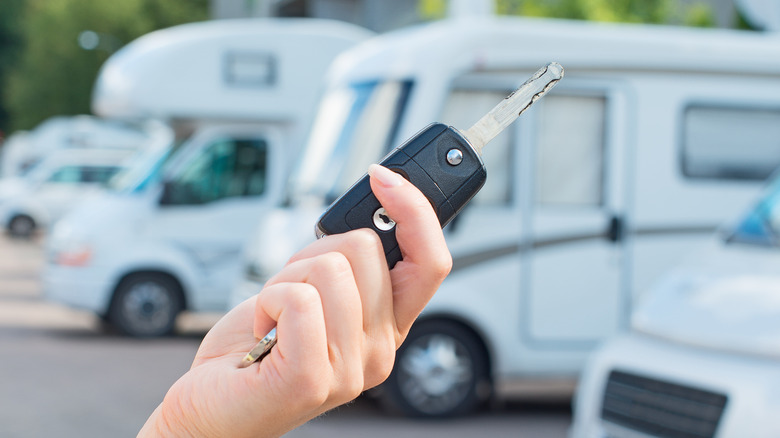
Owning an RV versus renting one is an important choice. Each option comes with its distinct advantages, challenges, and considerations. Owning an RV translates to equity, giving you an asset that may retain much of its value over time. You can also customize your RV to fit individual needs and preferences, and depending on how often you plan on using it, your RV will always be available for a spontaneous trip. However, the cons of ownership include high initial costs, ongoing maintenance expenses, depreciation of the RV’s value, storing it, insurance, and registration fees.
On the flip side, renting an RV eliminates the substantial upfront costs associated with ownership. You can experience the RV lifestyle without a long-term financial commitment. Renters also enjoy the flexibility of selecting different RV models for each trip. However, the cons of renting include a lack of customization options and a lack of availability during peak seasons. While renting reduces some financial burdens, such as maintenance and depreciation, it may be less cost-effective for those who plan to travel frequently. The decision between owning and renting will hinge on individual preferences, financial considerations, and how often you plan to travel in your RV.
Factoring in size and amenities
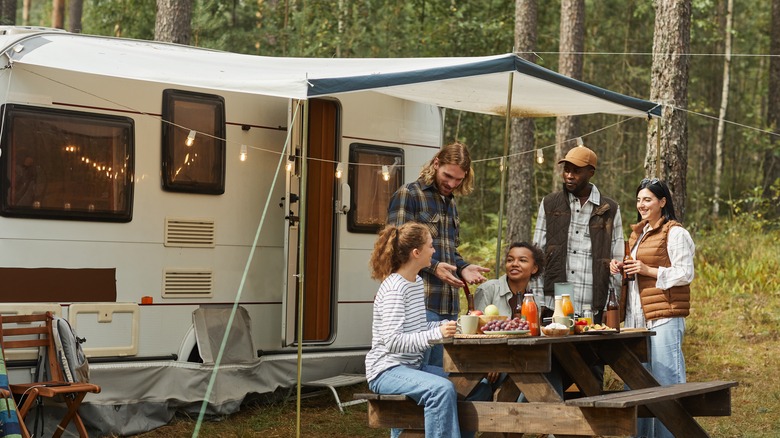
SeventyFour/Shutterstock
When trying to decide which RV is right for you, start by evaluating your travel style and needs. Where you plan to go, how long you’ll be traveling, and how you want to camp are all factors that come into play when choosing an RV. The number of people accompanying you is also important, dictating sleeping arrangements, packing, and overall comfort. When considering the right size RV for your road trip, you’ll first choose a class size. For instance, Class A motorhomes often boast spacious interiors with queen or king-sized beds in private bedrooms, providing comfort for couples or families, while Class C and B models are smaller but offer more flexibility.
Class A RVs may offer full bathrooms with showers, fully equipped kitchens, comfortable sitting areas, separate bedrooms, and entertainment systems, enhancing the overall comfort of your journey. That said, large RVs are incredibly expensive to operate, and you’ll have less flexibility when it comes to parking. However, if you’re planning on towing a vehicle, you may need the size and towing capacity of a large RV. Along with Class A, B, and C RVs, you may also consider a smaller, towable camper trailer, which allows optimal maneuverability and better fuel efficiency, ideal for shorter trips and camping in remote locations.
Navigating maintenance, repair, and emergency costs

Vgajic/Getty Images
If you bought or plan to buy an RV, ensuring a smooth and stress-free RV journey involves taking proactive measures for maintenance, repairs, and emergency preparedness. By prioritizing preventative maintenance, you can better avoid unexpected costs that may arise from breakdowns on the road, keeping your budget in check. Preventative measures may include routine checks on your RV’s engine, brakes, and fluid levels, as well as inspecting the roof for potential leaks and the tires for proper inflation and wear.
While upkeep and maintenance will help, you’ll still need to budget for potential repairs during your trip. This safety net is designed to cover unforeseen mechanical issues, such as engine trouble, transmission malfunctions, or plumbing leaks. Also, you can save lots of money by learning how to do some maintenance and repairs yourself. This may include learning how to troubleshoot electrical problems, fix plumbing issues, and perform basic engine repairs.
Before hitting the road, it’s wise to schedule a final, pre-travel maintenance check with a professional mechanic. While this will cost you upfront, if a professional maintenance check prevents a breakdown during the trip, it’s a cost-effective investment. Taking this precaution will help you reduce unnecessary or avoidable costs in maintenance, parts, and fees.
Cost-saving and smart campsite options
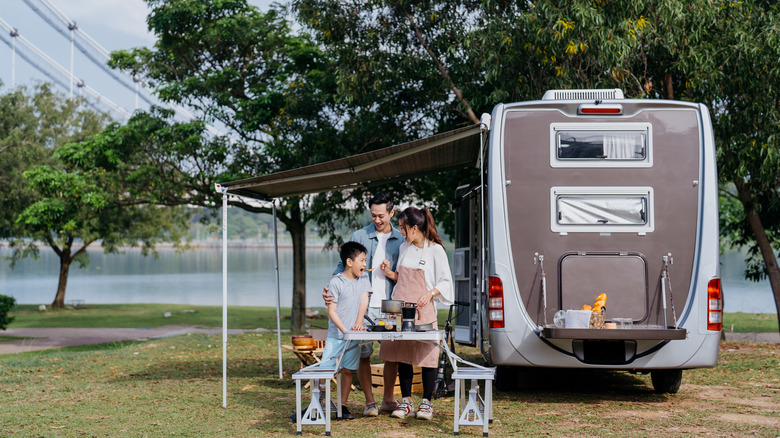
Hxyume/Getty Images
Now that your RV is ready to travel, there are strategic campsite planning strategies you can implement, especially if you plan to visit national parks and various locations while traveling, to maximize your budget. Some RV travelers save expenses by staying on unregulated public land, which is also known as boondocking. Joining RV clubs or purchasing memberships like Good Sam or Passport America can also open doors to valuable campground discounts. If you’re a senior citizen, military personnel, or AAA member, you can also capitalize on special discounts when selecting campgrounds.
You can also research and stick to free camping options, such as staying on Bureau of Land Management (BLM) land, national forests, and accommodating Walmarts or casinos. These are all examples of how to find free overnight parking for your RV. You can also ask various RV parks if they offer discounts to members, which is something to consider if you plan on sticking to the same routes. Investing in an America the Beautiful Pass is also a savvy idea for maximizing your budget. After purchasing the annual pass, you’ll receive free access to national parks and lands managed by the U.S. Fish & Wildlife Service. This is a great option if you plan to frequently camp on these lands.
Saving on energy and internet costs

Hraun/Getty Images
Efficiently managing both energy consumption and internet expenses is a key aspect of optimizing your RV lifestyle. Invest in energy-efficient appliances and lighting, such as LED bulbs, Energy Star-rated refrigerators, and high-efficiency air conditioners. Upgrading to modern, energy-conscious equipment, like smart thermostats and inverter-based generators, is also going to further enhance your RV’s efficiency and maximize your budget. Inverter-based generators are also great options. They are quieter, more fuel-efficient, and produce cleaner power, minimizing their environmental impact.
For a more sustainable and self-sufficient approach, consider installing solar panels on your RV. This investment allows you to generate your own electricity, reducing reliance on RV park hookups and providing a cost-effective solution for long-term energy needs. While you can utilize free Wi-Fi at campsites and public places whenever possible, you can also enhance your connectivity with Wi-Fi extenders and boosters, giving you a stronger and more reliable signal, especially if you are working while traveling.
You can also explore RV-specific Wi-Fi plans that cater to the unique needs of mobile living. Alternatively, leveraging your existing phone provider plans for hotspot capabilities can be a cost-effective solution, or consider a portable router to create a dedicated Wi-Fi network in your RV. In truth, whether you’re a road trip cheapskate trying to save as much money as possible or a traveler transitioning into a nomad lifestyle, trimming down your energy and internet expenses isn’t difficult with planning.
Efficient waste management and water conservation
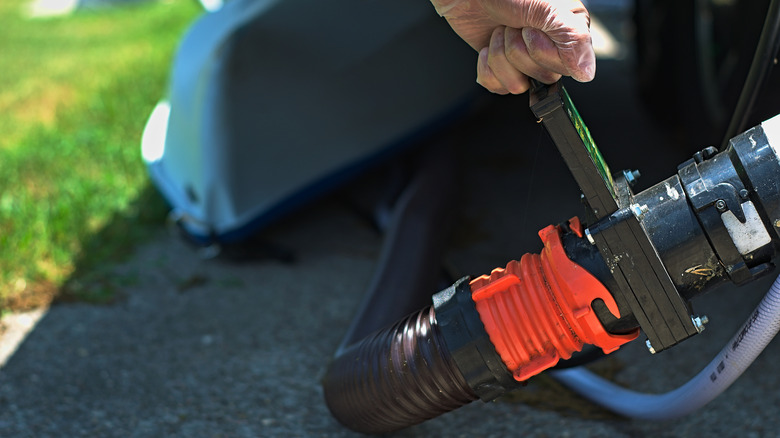
Cass Tippit/Shutterstock
As an RV owner or renter, you’ll have to find dump stations for both your gray water (nontoilet water sources) and black water (toilet-specific) tanks. Efficient waste management is crucial for a cost-effective RV lifestyle. To avoid incurring fees at campgrounds, locate free or low-cost dump stations for emptying your RV’s waste tanks. Websites and apps like Sanidumps and RV Dump Sites provide comprehensive directories of dump stations across the country, offering a convenient way to plan your route with waste disposal in mind. You’ll also need the tools and supplies to dump your waste, such as the hose and hose attachments.
Practicing water conservation is a smart strategy to extend the time between fill-ups. You can install water-efficient faucets and showerheads, as well as opt for a composting toilet and water filters. These sustainable practices also ensure you have access to clean and safe drinking water throughout your journey, providing a budget-friendly and eco-conscious solution. While these may seem like additional measures, in the end, they conserve resources and help lower overall RVing costs.
Fuel efficiency and navigation
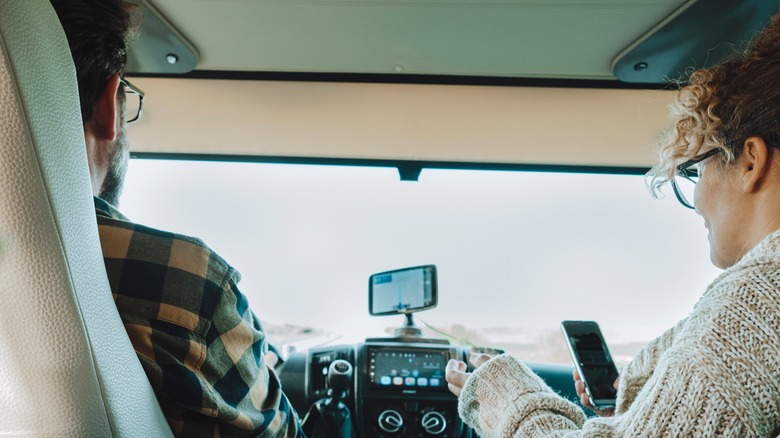
simona pilolla 2/Shutterstock
Your choice of navigation apps can play a pivotal role in overall convenience and reducing gas costs. For those engaging in long, extended travels, RV-specific GPS apps and websites become invaluable for seamless navigation. Take advantage of destination apps such as inRoute, CoPilot RV, and RV Trip Wizard, which are designed to guide RVers on routes suitable for their vehicles.
Along with maximizing your fuel budget by using apps or websites, you can also incorporate fuel-efficient driving techniques that improve your gas mileage while traveling. Maintaining a steady speed, using cruise control, reducing weight, and avoiding idling all contribute to your overall fuel savings. To complement these efforts, you can find the best fuel prices along your route through apps like GasBuddy and Gas Guru.
When considering fuel-efficient RV options, classes like Class B RVs (campervans) and Class C RVs with smaller chassis are known for better fuel efficiency compared to larger Class A models. Towable trailers and hybrid RVs also offer advantages in weight and aerodynamics, contributing to your potential fuel efficiency.
Meal planning and food costs
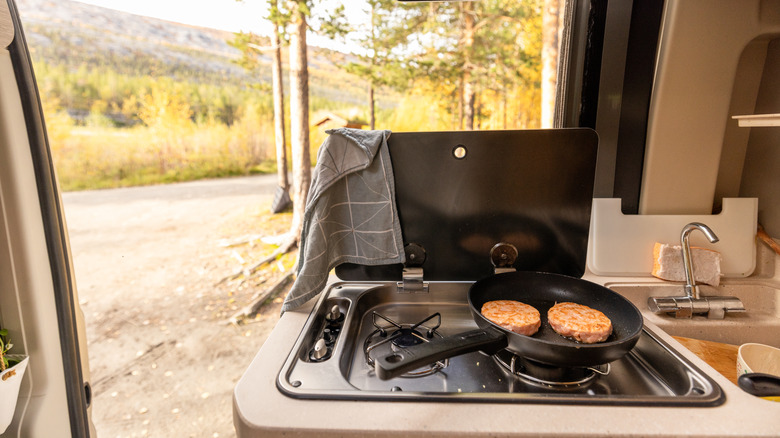
Mystockimages/Getty Images
To save money on food when RVing, you can apply the same budget-friendly tips you may practice at home. This may include buying produce in season, meal planning, and purchasing non-perishable, versatile ingredients that can be used in multiple dishes. For example, grains, legumes, and canned goods are efficient choices that save space and offer diverse meal options. To further streamline your dining budget, consider a combination of groceries and prepared foods. But, at the end of the day, your food costs will come down to your food preferences, the number of people you’re traveling with, if you plan to buy food at popular attractions, eating out habits, and how remote you’ll be.
If you’re not too remote, then save money on groceries by strategically shopping and planning ahead. Download the apps of common supermarkets near your route to access exclusive deals and promotions. Utilize digital coupons through these apps or traditional couponing websites to cut down on grocery costs. Exploring affordable dining options on the road is another budget-friendly strategy. Look for local farmers’ markets for fresh and often more affordable produce.
Additionally, while this is a no-brainer, preparing meals versus eating out will almost always be less expensive. Also, cooking your meals at your RV campsite, using communal grills or fire pits, can cut down on utility costs. By integrating these tips into your meal planning and grocery shopping, you can both save money and immerse yourself in the RV communities at campgrounds.
Entertainment and activities
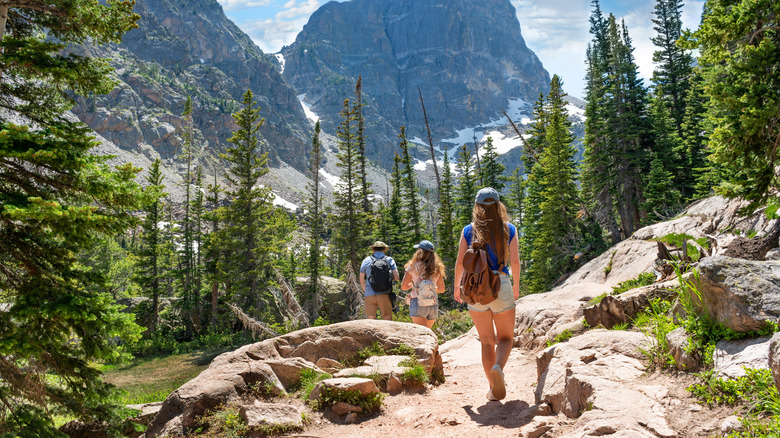
Margaretw/Getty Images
Many regions offer free parks or public spaces where you can unwind and enjoy scenic views. National parks often have free admission days, providing an excellent opportunity to explore iconic landscapes without breaking the bank. Or, as previously mentioned, you can invest in an America the Beautiful Pass. To save money on activities, choose budget-friendly outdoor activities and seek out local events or festivals happening along your route. These activities can offer you a chance to immerse yourself in the culture and entertainment of different communities at little or no cost.
Equip your RV with onboard entertainment options like a TV and movies for cozy nights in. Consider streaming services or DVDs that you already own to minimize additional expenses. You can also plan to use devices such as AppleTV or ROKU to minimize the amount of equipment in your RV. Utilizing free or low-cost campground amenities, such as communal game rooms and libraries, is also a great option, especially when traveling with kids.
When managing entertainment expenses, plan ahead by setting a budget for activities like movie nights or dining out. Take advantage of discount programs or memberships, like AAA, which may offer savings on attractions and services. You don’t have to sacrifice entertainment when traveling, but by incorporating these tips, you can strike a balance between enjoying quality entertainment and keeping your budget intact during your travels.
Be flexible but prepared
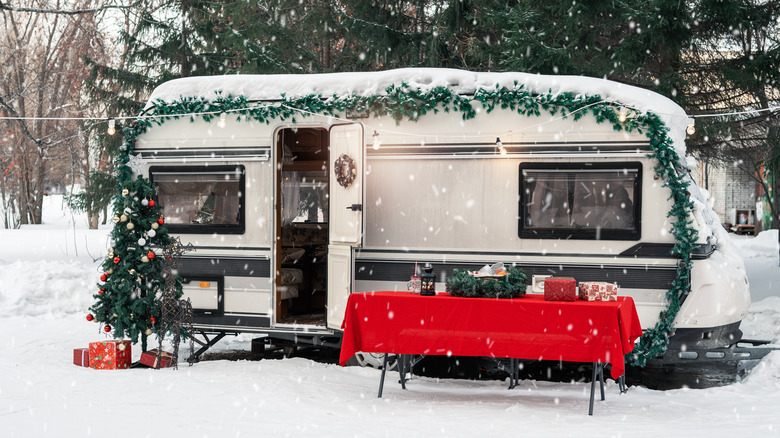
Rusak/Getty Images
To both potentially save money and create memorable experiences, maintain flexibility in your RV journey. Be open to last-minute changes in your itinerary, allowing you to capitalize on unexpected attractions or discounts. Be open to meeting other travelers and taking advice while on the road. This collaborative approach not only fosters camaraderie; it can also help you save money. Trust us, you’re not the only one trying to maximize your road trip budget, and seasoned RVers are typically excited to share insider info.
In the spirit of flexibility, it’s also important to spend money when necessary instead of “risking it.” For example, if you need to choose between driving through inclement weather or pulling over at a roadside hotel or nearby campsite for the night, stay safe and embrace the change of plans. No amount of cost-saving planning is more important than the safety of you and your passengers. After all, you have emergency funds for a reason. By striking a balance between flexibility and budget-planning preparedness, you can navigate your RV journey safely and with confidence.

